翻译网站unit13
制药工程专业英语 Unit 13 课文翻译

Unit 13 Sterile ProductsSterile ProductsSterile products are dosage forms of therapeutic agents that are free of viable microorganisms. Principally,these include parenteral,ophthalmic,irrigating preparations. Of these, and parenteral products are unique among dosage forms of drugs because they are injected through the skin or mucous membranes into internal body compartment. Thus,because they have circumvented the highly efficient first line of body defense,the skin and mucous membranes,they must be free from microbial contamination and from toxic components as well as possess an exceptionally high level of purity. All components and processes involved in the preparation of these products must be selected and designed to eliminate,as much as possible,contamination of all types,whether of physical,chemical,or microbiologic origin.Preparations for the eye, though not introduced into internal body cavities,are placed in contact with tissues that are very sensitive to contamination. Therefore,similar standards are required for ophthalmic preparations).Irrigating solutions are now also required to meet the same standards as parenteral solutions because during an irrigation procedure,substantial amounts of these solutions can enter the bloodstream directly through open blood vessels of wounds or abraded mucous membranes. Therefore,the characteristics and standards presented in this chapter for the production of large-volume parenteral solutions apply equally to irrigating solutions. Sterile products are most frequently solutions or suspensions,but may even be solid pellets for tissue implantation. The control of a process to minimize contamination for a small quantity of such a product can be achieved with relative ease. As the quantity of product increases,the problems of controlling the process to prevent contamination multiply. Therefore,the preparation of sterile products has become a highly specialized area in pharmaceutical processing. The standards established,the attitude of personnel,and the process control must be of a第13 单元无菌产品无菌产品无菌产品是不含微生物活体的治疗剂剂型,其主要包括非肠道用的、眼用的和冲洗用的制剂。
新目标九年级英语Unit 13 Section B 2b翻译

Unit 13 Section B 2b翻译再考虑,再使用,再回收!你经常扔掉你不需要的东西吗?你曾经想过这些东西实际还能被好好利用吗?如果你有创造性的智慧,就没有一样东西是垃圾。
你可能从为听说过艾米*海雅斯,而她是个最不寻常的女人,她住在英国,房子是她自己用废弃物建造的,窗户和门来自她们小镇上附近被推倒的旧建筑。
房屋顶部是一艘倒扣的渔船,她房子前面的大门是用岩石和旧玻璃做的。
艾米最近获得了一枚拯救我们的星球组织颁发的奖章。
组织的人说艾米是我们所有人的榜样。
艾米不擅长回收利用的唯一一个人。
来自香港的杰西卡*王用人们不再穿的旧衣服制作袋子。
如今,她已经做了好几年了。
她开了一家小商店来出售她的袋子,她还开网站在网上出售。
她尤其喜欢用旧的牛仔裤来做手袋。
她的袋子既可爱又实用。
我计划写一本书来介绍使用旧衣服的新方法,她说我希望人们都能看我的书,而且喜欢他!王涛四年前在上海做生意,他因使用旧汽车上的铁和其他材料做漂亮的艺术品而众所周知。
有一些是很大的作品,看起来像动物和人一些较小的你可以放在家里。
更受欢迎的作品甚至出现在城市各处的艺术商店。
王涛希望建立一个铁艺术主题公园,来向人们展示环境保护的重要性。
艺术不仅能将幸福带给人,它也显示出只要有一点创造性,就算是冰冷坚硬的铁也能被重新赋予生命。
小学二(2)班班规一、安全方面1、每天课间不能追逐打闹。
2、中午和下午放学要结伴回家。
3、公路上走路要沿右边走,过马路要注意交通安全。
4、不能在上学路上玩耍、逗留。
二、学习方面1、每天到校后,不允许在走廊玩耍打闹,要进教室读书。
2、每节课铃声一响,要快速坐好,安静地等老师来上课。
3、课堂上不做小动作,不与同桌说悄悄话,认真思考,积极回答问题。
4、养成学前预习、学后复习的好习惯。
每天按时完成作业,保证字迹工整,卷面整洁。
5、考试时做到认真审题,不交头接耳,不抄袭,独立完成答卷。
三、升旗排队和两操方面1、升旗时,要快速出教室排好队,做到快、静、齐,安静整齐地排队走出课室门,班长负责监督。
商务英语翻译Unit13解答
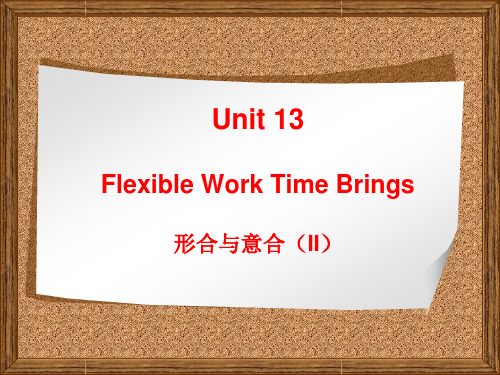
弱式短语: Give rise to (arouse) / make contact with (meet) / arrive at a decision (decide) / bring to a conclusion (finish) / take into consideration (consider) / conduct an investigation into (investigate)
过分使用名词化会使语言抽象、冗长、含糊、缺乏活力。
2.用名词表示施事者,以代替动词。 He is a good eater and a good sleeper. - 他能吃能睡。
3.名次代替形容词(名词连用),构成标题式短语。 Space shuttle flight test program - 航天飞机试飞计划
• 汉语动词常常重复或重叠,可以加强汉语动态感的表现力。
说说笑笑,跑跑跳跳,孩子们十分愉快。 - Talking and laughing, running and jumping, the children had a
good time.)
英汉互译过程是静态和动态相互转换的过程。
Ford’s first pledge was, “Mr. President, you have my support and my loyalty.” - 福特一开始就保证说:“总统先生,我支持您,并效忠于您。”(静-动)
静态与动态
英语倾向于多用名词,因而叙述呈静态;汉语倾向多用动词,因而叙述呈 动态。 英语静态倾向表现为:
UNIT13Weretryingtosavetheearth原文与翻译

UNIT13We'retryingtosavetheearth原文与翻译《牛津初中英语》充分体现了《新课标》的诸多精神。
该教材具有两大特点。
下面是小偏整理的UNIT13We'retryingtosavetheearth 原文与翻译,感谢您的每一次阅读。
UNIT13We'retryingtosavetheearth原文与翻译SectionA1bListenandcompletethesentences.Tony:Hey,Mark,maybewecouldgoswimmingintheriverlaterthi safternoon.Mark:Idon’tthinkIwanttogo,Tony.Tony:Whynot?Mark:Iwastherelastweekendandtheriverwasreallydirty.Eventh ebottomoftheriverwasfullofrubbish,andtherewerenomorefishforf ishermentocatch.Tony:Noway!Itusedtobesoclean.Infact,ithasalwaysbeentheni cestriverinthistown.Mark:Notanymore.Ithinkpeoplearethrowinglitterintotheriver. Factoriesarealsoputtingwasteintotheriver.Tony:That’sterrible!Weshouldwritetothegovernment.Theys houldclosedownthefactories.Mark:Goodidea!ButIthinkeveryoneinthistownshouldhelptocl eanuptheriver,too.Everyoneshouldplayapart,notjustthegovernm entSectionA2aListentotheinterview.thekindsofpollutionthatJasonandSusan talkabout.Interviewer:T odaywe’retalkingtoJason andSusanaboutenvir onmentalproblems.JasonandSusan,canyoutellusaboutsomeofth eproblemsyou’veseen?Jason:Ithinkoneproblemisthattheairisbadlypolluted.Ihardlye verseeblueskiesanymore.Susan:Yes,andIusedtoseethestarsclearly.Interviewer:Whatdoyouthinkhascausedthisproblem?Susan:Well,therearemorecarsontheroadthesedays.Jason:Andfactoriesthatburncoalalsopollutetheairwithalotofb lacksmoke.Interviewer:Whatotherproblemsdoyousee?Susan:Iguessthere’stoomuchrubbishandwasteinthestreets.Jason:Yes!Everydaypeoplearethrowingawaythingslikewoode nchopsticks,plasticbowlsandplasticbags.Susan:They’realsolitteringinpublicplaces,forexample,durin gpicnicsinparks.Thisisturningbeautifulplacesintouglyones.Interviewer:You’reright.Theseareseriousproble msforourenv ironment.Next,let’stalkaboutthethingswecandotohelp.SectionA2bListenagainandcompletethesentences.Interviewer:T odaywe’retalkingtoJasonandSusanaboutenvir onmentalproblems.JasonandSusan,canyoutellusaboutsomeofth eproblemsyou’veseen?Jason:Ithinkoneproblemisthattheairisbadlypolluted.Ihardlye verseeblueskiesanymore.Susan:Yes,andIusedtoseethestarsclearly.Interviewer:Whatdoyouthinkhascausedthisproblem?Susan:Well,therearemorecarsontheroadthesedays.Jason:Andfactoriesthatburncoalalsopollutetheairwithalotofb lacksmoke.Interviewer:Whatotherproblemsdoyousee?Susan:Iguessthere’stoomuchrubbishandwasteinthestreets.Jason:Yes!Everydaypeoplearethrowingawaythingslikewoodenchopsticks,plasticbowlsandplasticbags.Susan:They’realsolitteringinpublicplaces,forexample,d urin gpicnicsinparks.Thisisturningbeautifulplacesintouglyones.Interviewer:You’reright.Theseareseriousproblemsforourenv ironment.Next,let’stalkaboutthethingswecandotohelp.SectionA2dRoleplaytheconversation.JasonandSusan,whatareyourideasforsolvingtheseproblems?Well,tocutdownairpollution,weshouldtakethebusorsubwayin steadofdriving.Yeah,orrideabike.Thereareotheradvantagesofbikeriding.It'sg oodforhealthitdoesn'tanythingGreatideas!Whataboutwastepollution?Mmm,Ithinksimplethingslikebringingabagtogoshoppingcan help.Istarteddoingthatayearago.Me,tooAlso,Inevertakewoodenchopsticksorplasticforkswhen Ibuytakeawayfood.Iusetheonesathome.Andremembertothrowrubbishinthebinsandkeeppublicplace scleanandbeautifulforeveryone.Sotogether,ouractionscanmakeadifferenceandleadtoabetter future!SectionA3aReadthepassageaboutsharksandcompletethefactsheetbelow.SavetheSharks!Manyhaveheardofsharkfinsoup.Thisfamousandexpensivedis hisespeciallypopularinsouthernChina.Butdoyourealizethaty ou’r ekillingawholesharkeachtimeyouenjoyabowlofsharkfinsoup?Whenpeoplecatchsharks,theycutofftheirfinsandthrowthesha rkbackintotheocean.Thisisnotonlycruel,butalsoharmfultotheenvir onment.Withoutafin,asharkcannolongerswimandslowlydies.Sharksar eatthetopofthefo odchainintheocean’secosystem.Iftheirnumber sdroptoolow,itwillbringdangertoalloceanlife.Manybelievethatsharkscanneverbeendangeredbecausethey arethestrongestintheirfoodchain.Butinfact,around70millionshark sarecaughtandtradedinthisindustryeveryyear.Thenumbersofsomekindsofsharkshavefallenbyover90percen tinthelast20to30years.Environmentalprotectiongroupsaroundthe world,suchasWildAidandtheWWF,areteachingthepublicabout“fi nning”.Theyhaveevenaskedgovernmentstodeveloplawstostopthesal eofsharkfins.Sofar,noscientificstudieshaveshownthatsharkfinsare goodforhealth,sowhyeatthem?Helpsavethesharks!SectionB1cListenandcheck(√)thethingsthatJuliaandJacktalkabout.Jack:Turnoffthelights,Julia.Itsaveselectricity.Julia:Oh,Iusuallydothat.Iwasjustinahurry.Jack:Isee.I’vejustreadabookwh ichgivesideasabouthowweca nsavetheenvironment.Forexample,youshouldturnofftheshowerw henyou’rewashingyourhair.Julia:Oh,Iwouldneverdothat.Ihaveveryshorthair.Itonlytakesaf ewminutestowash.Whatelsedoesitsay?Jack:Youshouldtakeyourownbagswhenyougoshopping.Julia:Oh,that’seasy.I’lldothatfromnowon.Whatelse?Jack:Peopleshouldstopridingincarsandstartridingbikes.Julia:Noway!Itwouldtakeme45minutestogettoschoolbybike!Jack:Butit’sgoodfortheenvironment!Besides,Ilikeridingmybi ke.Julia:Yes,andyoualsoliveclosetoschool!SectionB1dListenagain.Check(√)thethingsthatJuliaisdoingnow,thethings shewilldointhefutureandthethingsshewouldneverdo.Jack:Turnoffthelights,Julia.Itsaveselectricity.Julia:Oh,Iusuallydothat.Iwasjustinahurry.Jack:Isee.I’vejustreadabookwhichgiveside asabouthowweca nsavetheenvironment.Forexample,youshouldturnofftheshowerw henyou’rewashingyourhair.Julia:Oh,Iwouldneverdothat.Ihaveveryshorthair.Itonlytakesaf ewminutestowash.Whatelsedoesitsay?Jack:Youshouldtakeyourownbagswhenyougoshopping.Julia:Oh,that’seasy.I’lldothatfromnowon.Whatelse?Jack:Peopleshouldstopridingincarsandstartridingbikes.Julia:Noway!Itwouldtakeme45minutestogettoschoolbybike!Jack:Butit’sgoodfortheenvironment!Besides,Ilikeridingmybi ke.Julia:Yes,andyoualsoliveclosetoschool!SectionB2bReadthepassageandcompletethechartbelow.Rethink,Reuse,Recycle!Doyouoftenthrowawaythingsyoudon’tneedanymore?Have youeverthoughtabouthowthesethingscanactuallybeputtogoodu se?Nothingisawasteifyouhaveacreativemind.Youhaveprobablyn everheardofAmyHayes,butsheisamostunusualwoman.Shelivesin ahouseintheUKthatshebuiltherselfoutofrubbish.Thewindowsanddoorscomefromoldbuildingsaroundhertow nthatwerepulleddown.Thetopofthehouseisanoldboatturnedupsi dedown.Andthegateinfrontofherhouseismadeofrocksandoldglas sbottles.AmyrecentlywonaprizefromtheHelpSaveOurPlanetSociety.Thepresidentsaid,“Amyisaninspirationtousall.”Amyisn’ttheonlyonewhoisgoodatrecycling.JessicaWongfro mHongKongusesoldclothesthatpeop ledon’twearanymoretoma kebags.Shehasbeendoingthisforafewyearsnow.Sheopenedasmallshopwhereshesellsherbags,andshehasalso setupawebsitetosellthemonline.Sheespeciallylikestouseoldjeanst omakehandbags.Herbagsarecuteanduseful.“Iplantowriteabookaboutnewwaystouseoldclothes,”shesai d.“Ihopepeoplecanreadmybookandenjoyit!”WangTaosetupasmallbusinessinShanghaifouryearsago.Heisk nownforusingironandothermaterialsfromoldcarstomakebeautifu lartpieces.Somearelargepiecesthatlooklikeanimalsorhumans,and somearesmallerpiecesyoucanputathome.Themorepopularworks canevenbeseeninartshopsaroundthecity.WangTaohopestosetupa“metalart”themeparktoshowpeop letheimportanceofenvironmentalprotection.Notonlycantheartbri nghappinesstoothers,butitalsoshowsthatevencold,hardironcanb ebroughtbacktolifewithalittlecreativity.翻译:SectionA2d采访者:贾森和苏珊,对于解决这些问题,你们有什么想法?贾森:为了减少空气污染,我们应该乘坐公共汽车或者地铁,而不是开车。
Unit 13 Friendship课文翻译

Unit 13 Friendship1. 我们的友善远非言语可以表达。
尽管私心像东面来袭的寒风吹过大地,整个人类却依然沐浴在爱的阳光里。
有多少人,我们与他们邂逅在厅堂,甚至从未交谈,可我们却尊敬他们,他们也尊敬我们!又有多少人,我们在街头看见他们,或者与他们同坐于教堂之内,虽然默默无言,我们却非常乐意与他们在一起!读读这些游移目光背后的语言,你内心就会明白。
2. 沉浸在仁爱之中,是一种发自内心的愉悦。
在诗歌里,在日常交谈中,对他人的仁义之德和满足之情,常常被喻为烈火的真实效果,这些发自内心的美丽光辉也同样迅猛,或许更迅猛、更活跃、更振奋人心。
从最炽热的爱情到最普通的善意,这些情感让生活美妙无比。
3. 我们的智力与能量因情感而增强。
一位学者端坐桌前,他数年的沉思激发不出思想的火花和快乐的语言;但当他有必要给友人写信时,心头便会立即情思泉涌、妙语连珠。
4. 看一看,一位陌生的访客,会使一户善良自尊的人家多么激动。
一番等待过后,当一位受人赞誉的陌生人到访时,全家上下无不诚惶诚恐,喜悲交加。
他的造访几乎使迎接他的好心人感到恐慌。
这家人将房屋打扫干净,归整所有家当,旧衣换成新装,还要尽可能设宴招待。
对于这位享有美誉的陌生人,别人的谈论只是些溢美之辞,我们听到的也只是些有关他的新闻善事。
对我们而言,他代表人性,更代表了我们的理想。
对他这般构想一番并寄予厚望之后,我们开始寻思应该如何同这样一个人进行交谈、相处,内心便惶恐不安起来。
同样的想法又增进了我们与之谈话的兴致,我们比平日更为健谈,思维极其敏快,记忆更为丰富,素日的沉默也一时被彻底打破。
我们长时间与之进行一连串真诚优雅、内容丰富的交谈,谈论自己最早最隐秘的经历,以至于坐在我们身边的亲属和熟人都对我们少见的才能惊诧不已。
但是一旦这个陌生人硬把他的偏袒、臆断和缺陷扯进谈话中,一切就都结束。
他从我们这里听到了他所能听到的最初的、最后的、最好的言语。
现在,他已不再陌生。
高二英语必修5Unit13 People课文翻译

Unit13 PeopleWarm-up 热身Listen to the police description.听警方的描述Which people in the photo below are the police looking for?下面图片中的哪个人是警方要找的对象Police are looking for four people in connection with a crime.警方正在寻找与案件有关的四个嫌疑人They were last seen in the London area.他们最后一次出现是在伦敦The first is a white man.第一个是白人He is quite tall with short, dark hair.他个头很高,留着黑色的短发He was last seen wearing a black baseball cap, a blue long-sleeve shirt and sunglasses.他最后一次出现时戴着一顶黑色的棒球帽、一副太阳镜,穿着一件蓝色的长袖衬衫。
The second is a white man wearing glasses.第二个是戴着眼镜的白人He has little hair and was last seen wearing a white shirt and holding books under his arm.他头发很少,最后一次出现时穿着白色的衬衫,腋下夹着书The third is a black woman.第三个是黑人妇女She has short hair and was last seen wearing a black and white T-shirt with a gold chain around her neck. 她留着短发,最后一次出现时穿着黑白相同的T恤,脖子上戴着金项链。
研究生英语课文翻译Unit 13
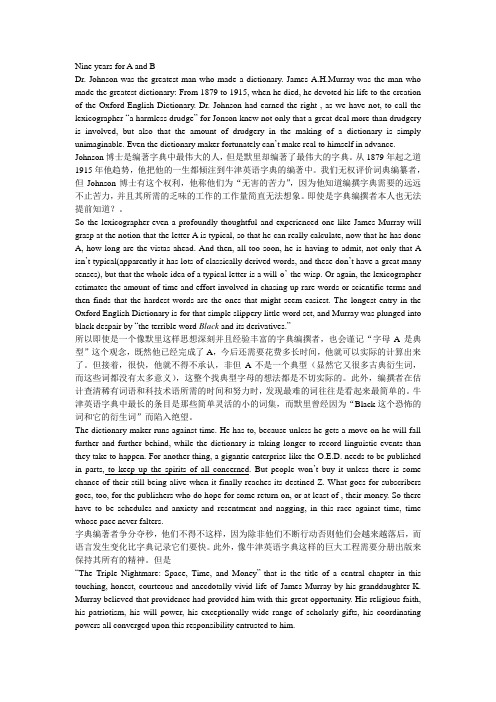
Nine years for A and BDr. Johnson was the greatest man who made a dictionary. James A.H.Murray was the man who made the greatest dictionary: From 1879 to 1915, when he died, he devoted his life to the creation of the Oxford English Dictionary. Dr. Johnson had earned the right , as we have not, to call the lexicographer “a harmless drudge” for Jonson knew not only that a great deal more than drudgery is involved, but also that the amount of drudgery in the making of a dictionary is simply unimaginable. Even the dictionary maker fortunately can’t make real to himself in advance. Johnson博士是编著字典中最伟大的人,但是默里却编著了最伟大的字典。
从1879年起之道1915年他趋势,他把他的一生都倾注到牛津英语字典的编著中。
我们无权评价词典编纂者,但Johnson博士有这个权利,他称他们为“无害的苦力”,因为他知道编撰字典需要的远远不止苦力,并且其所需的乏味的工作的工作量简直无法想象。
即使是字典编撰者本人也无法提前知道?。
So the lexicographer-even a profoundly thoughtful and experienced one like James Murray-will grasp at the notion that the letter A is typical, so that he can really calculate, now that he has done A, how long are the vistas ahead. And then, all too soon, he is having to admit, not only that A isn’t typical(apparently it has lots of classically derived words, and these don’t have a great many senses), but that the whole idea of a typical letter is a will-o’-the-wisp. Or again, the lexicographer estimates the amount of time and effort involved in chasing up rare words or scientific terms and then finds that the hardest words are the ones that might seem easiest. The longest entry in the Oxford English Dictionary is for that simple slippery little word set, and Murray was plunged into black despair by “the terrible word Black and its derivatives.”所以即使是一个像默里这样思想深刻并且经验丰富的字典编撰者,也会谨记“字母A是典型”这个观念,既然他已经完成了A,今后还需要花费多长时间,他就可以实际的计算出来了。
翻译练习答案Unit13

15. 我的英语不如哥哥,但是化学比他好。(inferior) I am inferior to my elder brother in English while he is
inferior to me in chemistry. 16. 上课拿同学开玩笑就等同于让他难堪。(be equivalent to )
Playing a joke on your classmate in class is equivalent to
embarrassing him. 17. 大笑可以增强我们的免疫系统,并且降低血压和脉搏速率。 (laughter) Laughter can strengthen our immune system and lower
Now, most of the college students can be free to choose
the courses they like. 8. 和他讨论这样的事情毫无意义。(point) There’s no point in discussing with him about it. 9. 只有通过不断实践, 你才可以提高自己的英语口语。( Only)
judge the whole person.
Unit 2 1. 我相信博学使人谦逊,无知使人骄傲。(belief, humble )
I hold a belief that knowledge makes people humble while
ignorance makes people arrogant. 2. 他停下来和同伴讨论了一些事情,然后继续提问。( proceed)
played a joke on. 13. 使我们吃惊的是,他并不受同事的欢迎。(be popular with )
Unit-13-Our-Schedules--Our-Selves课文翻译综合教程三

Unit 13Our Schedules, Our SelvesJay Walljasper1 DAMN! You’re 20 minutes —no, more like half an hour —late for your breakfast meeting, which you were hoping to scoot out of early to make an 8:30 seminar across town. And, somewhere in there, there’s that conference call. Now, at the last minute, you have to be at a 9:40 meeting. No way you can miss it. Let’s see, the afternoon is totally booked, but you can probably push back your 10:15 appointment and work through lunch. That would do it. Whew! The day has barely begun and already you are counting the hours until evening, when you can finally go home and happily, gloriously, triumphantly, do nothing. You’ll skip yoga class, blow off the neighborhood meeting, ignore the piles of laundry and just relax. Yes! … No! Tonight’s the night of the concert. You promised Nathan and Mara weeks ago that you would go. DAMN!2 Welcome to daily grind circa 2003 — a grueling 24-7 competition against the clock that leaves even the winners wondering what happened to their lives. Determined and sternly focused, we march through each day obeying the orders of our calendars. The idle moment, the reflective pause, serendipity of any sort have no place in our plans. Stopping to talk to someone or slowing down to appreciate a sunny afternoon will only make you late for your next round of activities. From the minute we rise in the morning, most of us have our day charted out. The only surprise is if we actually get everything done that we had planned before collapsing into bed at night.3 On the job, in school, at home, increasing numbers of North Americans are virtual slaves to their schedules. Some of what fills our days are onerous obligations, some are wonderful opportunities, and most fall in between, but taken together they add up to too much. Too much to do, too many places to be, too many things happening too fast, all mapped out for us in precise quarter-hour allotments on our palm pilots or day planners. We are not leading our lives, but merely following a dizzying timetable of duties, commitments, demands, and options. How did this happen? Where’s the luxurious leisure that decades of technological progress was supposed to bestow upon us?4 The acceleration of the globalized economy, and the accompanying decline of people having any kind of a say over wages and working conditions, is a chief culprit. Folks at the bottom of the socio-economic ladder feel the pain most sharply. Holdingdown two or three jobs, struggling to pay the bills, working weekends, no vacation time, little social safety net, they often feel out of control about everything happening to them. But even successful professionals, people who seem fully in charge of their destinies, feel the pinch. Doctors, for example, working impossibly crowded schedules under the command of HMOs, feel overwhelmed. Many of them are now seeking union representation, traditionally the recourse of low-pay workers.5 The onslaught of new technology, which promised to set us free, has instead ratcheted up the rhythms of everyday life. Cell phones, , and laptop computers instill expectations of instantaneous action. While such direct communication can loosen our schedules in certain instances (it’s easier to shift around an engagement on short notice), overall they fuel the trend that every minute must be accounted for. It’s almost impossible to put duties behind you now, when the boss or committee chair can call you at a rap show or sushi restaurant, and documents can be ed to you on vacation in Banff or Thailand. If you are never out of the loop, then are you ever not working?6 Our own human desire for more choices and new experiences also plays a role. Just like hungry diners gathering around a bountiful smorgasbord, it’s hard not to pile too many activities on our plates. An expanding choice of cultural offerings over recent decades and the liberating sense that each of us can fully play a number of different social roles (worker, citizen, lover, parent, artist, etc.) has opened up enriching and exciting opportunities. Spanish lessons? Yes. Join a volleyball team? Why not. Cello and gymnastics classes for the kids? Absolutely. Tickets to a blues festival, food and wine expo, and political fundraiser? Sure. And we can’t forget to make time for school events, therapy sessions, protest rallies, religious services, and dinner with friends.7 Yes, these can all add to our lives. But with only 24 hours allotted to us each day, something is lost too. You don’t just run into a friend anymore and decide to get coffe e. You can’t happily savor an experience because your mind races toward the next one on the calendar. In a busy life, nothing happens if you don’t plan it, often weeks in advance. Our “free” hours become just as programmed as the work day. What begins as an idea for fun frequently turns into an obligation obstacle course. Visit that new barbecue restaurant. Done! Go to tango lessons. Done! Fly to Montreal for a long weekend. Done!8 We’ve booked ourselves so full of prescheduled activities there’s no ti me left for those magic, spontaneous moments that make us feel most alive. We seldomstop to think of all the experiences we are eliminating from our lives when we load up our appointment book. Reserving tickets for a basketball game months away could mean you miss out on the first balmy evening of spring. Five p.m. skating lessons for your children fit so conveniently into your schedule that you never realize it’s the time all the other kids in the neighborhood gather on the sidewalk to play.9 A few years back, radical Brazilian educator Paulo Freire was attending a conference of Midwestern political activists and heard over and over about how overwhelmed people felt about the duties they face each day. Finally, he stood up and, in slow, heavily accent ed English, declared, “We are bigger than our schedules.” The audience roared with applause.10 Yes, we are bigger than our schedules. So how do we make sure our lives are not overpowered by an endless roster of responsibilities? Especially in an age where demanding jobs, two-worker households or single-parent families make the joyous details of everyday life -- cooking supper from scratch or organizing a block party —seem like an impossible dream? There is no set of easy answers, despite what the marke ters of new convenience products would have us believe. But that doesn’t mean we can’t make real steps to take back our lives.11 Part of the answer is political. So long as Americans work longer hours than any other people on Earth we are going to feel hemmed in by our schedules. Expanded vacation time for everyone, including part-time and minimum wage workers, is one obvious and overdue solution. Shortening the work week, something the labor movement and progressive politicians successfully accomplished in the early decades of the 20th century, is another logical objective. There’s nothing preordained about 40-hours on the job; Italy, France, and other European nations have already cut back working hours. An opportunity for employees outside academia to take a sabbatical every decade or so is another idea whose time has come. And how about more vacation and paid holidays? Let’s start with Martin Luther King’s birthday, Susan B. Anthony’s birthday, and your own! Any effort to give people more clout in the ir workplaces —from strengthened unions to employee ownership —could help us gain much-needed flexibility in our jobs, and our lives.12 On another front, how you think about time can make a big difference in how you feel about your life, as other articles in this cover section illustrate. Note how some of your most memorable moments occurred when something in your schedule fell through. The canceled lunch that allows you to spend an hour strolling around town. Friday night plans scrapped for a bowl of popcorn in front of the fireplace.Don’t be shy about shucking your schedule whenever you can get away with it. And with some experimentation, you may find that you can get away with it a lot more than you imagined.13 Setting aside some time on your calendar for life to just unfold in its own surprising way can also nurture your soul. Carve out some nonscheduled hours (or days) once in a while and treat them as a firm commitment. And resist the temptation to turn every impulse or opportunity into anoth er appointment. It’s neither impolite nor inefficient to simply say, “let me get back to you on that tomorrow” or “let’s check in that morning to see if it’s still a good time.” You cannot know how crammed that day may turn out to be, or how uninspired you might feel about another engagement, or how much you’ll want to be rollerblading or playing chess or doing something else at that precise time.14 In our industrialized, fast-paced society, we too often view time as just another mechanical instrument to be programmed. But time possesses its own evershifting shape and rhythms, and defies our best efforts to corral it within the tidy lines of our palm pilots or datebooks. Stephan Rechtschaffen, author of Time Shifting, suggests you think back on a scary auto collision (or near miss), or spectacular night of lovemaking. Time seemed almost to stand still. You can remember everything in vivid detail. Compare that to an overcrammed week that you recall now only as a rapid-fire blur. Keeping in mind that our days expand and contract according to their own patterns is perhaps the best way to help keep time on your side.日程,自我杰伊·沃尔贾斯珀1. 讨厌!迟到了20分钟——不对,差不多半小时了——本来还想着这早餐会议可以早早完毕,然后去赶8:30在城市另一端召开的交流会。
九年级英语Unit13 课文翻译
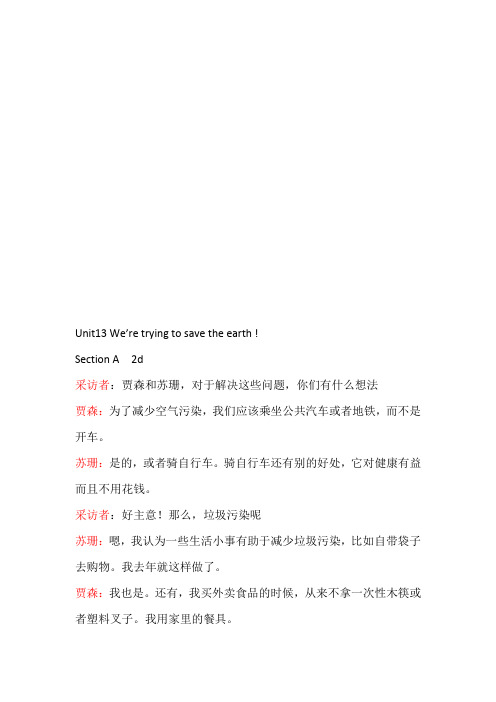
Unit13 We’re trying to save the earth !Section A 2d采访者:贾森和苏珊,对于解决这些问题,你们有什么想法贾森:为了减少空气污染,我们应该乘坐公共汽车或者地铁,而不是开车。
苏珊:是的,或者骑自行车。
骑自行车还有别的好处,它对健康有益而且不用花钱。
采访者:好主意!那么,垃圾污染呢苏珊:嗯,我认为一些生活小事有助于减少垃圾污染,比如自带袋子去购物。
我去年就这样做了。
贾森:我也是。
还有,我买外卖食品的时候,从来不拿一次性木筷或者塑料叉子。
我用家里的餐具。
苏珊:还要把垃圾扔进垃圾桶,保持公共场所的整洁和美丽,(这是)为了每个人。
采访者:所以,我们一起行动,就能影响他人,创造一个更美好的未来。
Section A ,3a拯救鲨鱼很多人都听说过鱼翅羹。
这道昂贵又著名的菜在中国南方特别流行。
但是每次当你喝鱼翅羹的时候,你是否意识到你杀了一整只鲨鱼当人们捕捉到鲨鱼的时候,他们切掉鲨鱼的鱼鳍,然后把它们扔回大海。
失去鱼鳍的鲨鱼再也不能再水里游,会慢慢死去。
这种做法不仅残忍,而且对环境有害。
鲨鱼处于海洋生态系统食物链的顶端,如果他们的数量下降得太多,将会给所有的海洋生物带来危害。
很多人认为鲨鱼永远不会濒临灭绝,因为他们是食物链的最强者。
但事实上,每年有七百万的鲨鱼被捕杀和交易。
在过去的20年到30年,某些品种的鲨鱼数量下降了超过90%。
世界各地的环保组织,如野生救援协会和世界自然基金会,都在向公众宣讲“猎翅的(残忍)行为。
他们甚至已经呼吁政府立法停止鱼翅的销售。
到目前为止,没有任何科学研究表明,鱼翅对健康有好处,那么为什么要吃他们呢帮助拯救鲨鱼吧!Section B , 2a重新思考重新使用,重新利用你经常扔掉你不在使用的东西吗你是否曾想过这些东西还能很好地重新利用如果你有一个充满创意的头脑,没有东西是废品。
你可能从来没听说过艾米.海斯,但她是一个非常不寻常的女性。
她住在英国,房子是她自己用废弃物建造而成的。
九年级英语Unit13 课文翻译
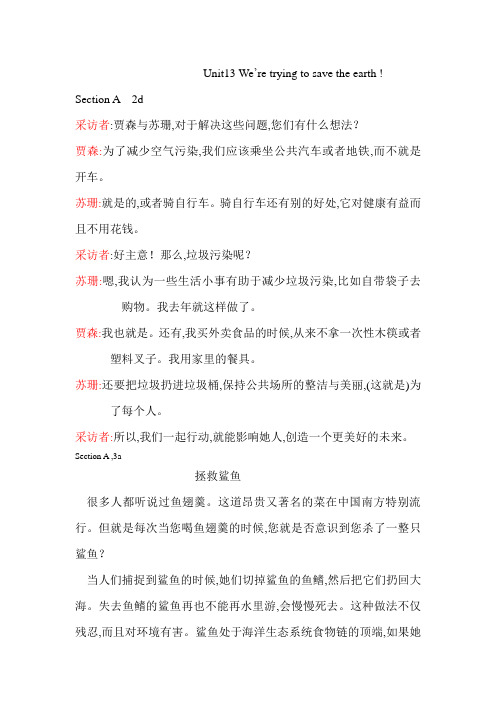
Unit13 We’re trying to save the earth ! Section A 2d采访者:贾森与苏珊,对于解决这些问题,您们有什么想法?贾森:为了减少空气污染,我们应该乘坐公共汽车或者地铁,而不就是开车。
苏珊:就是的,或者骑自行车。
骑自行车还有别的好处,它对健康有益而且不用花钱。
采访者:好主意!那么,垃圾污染呢?苏珊:嗯,我认为一些生活小事有助于减少垃圾污染,比如自带袋子去购物。
我去年就这样做了。
贾森:我也就是。
还有,我买外卖食品的时候,从来不拿一次性木筷或者塑料叉子。
我用家里的餐具。
苏珊:还要把垃圾扔进垃圾桶,保持公共场所的整洁与美丽,(这就是)为了每个人。
采访者:所以,我们一起行动,就能影响她人,创造一个更美好的未来。
Section A ,3a拯救鲨鱼很多人都听说过鱼翅羹。
这道昂贵又著名的菜在中国南方特别流行。
但就是每次当您喝鱼翅羹的时候,您就是否意识到您杀了一整只鲨鱼?当人们捕捉到鲨鱼的时候,她们切掉鲨鱼的鱼鳍,然后把它们扔回大海。
失去鱼鳍的鲨鱼再也不能再水里游,会慢慢死去。
这种做法不仅残忍,而且对环境有害。
鲨鱼处于海洋生态系统食物链的顶端,如果她们的数量下降得太多,将会给所有的海洋生物带来危害。
很多人认为鲨鱼永远不会濒临灭绝,因为她们就是食物链的最强者。
但事实上,每年有七百万的鲨鱼被捕杀与交易。
在过去的20年到30年,某些品种的鲨鱼数量下降了超过90%。
世界各地的环保组织,如野生救援协会与世界自然基金会,都在向公众宣讲“猎翅的(残忍)行为。
她们甚至已经呼吁政府立法停止鱼翅的销售。
到目前为止,没有任何科学研究表明,鱼翅对健康有好处,那么为什么要吃她们呢?帮助拯救鲨鱼吧!Section B , 2a重新思考重新使用,重新利用您经常扔掉您不在使用的东西不?您就是否曾想过这些东西还能很好地重新利用?如果您有一个充满创意的头脑,没有东西就是废品。
您可能从来没听说过艾米、海斯,但她就是一个非常不寻常的女性。
九年级英语Unit13 课文翻译
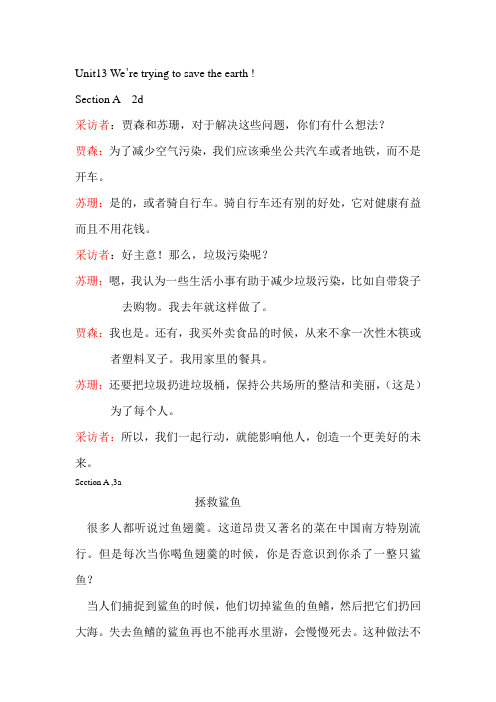
Unit13 We’re trying to save the earth !Section A 2d采访者:贾森和苏珊,对于解决这些问题,你们有什么想法?贾森:为了减少空气污染,我们应该乘坐公共汽车或者地铁,而不是开车。
苏珊:是的,或者骑自行车。
骑自行车还有别的好处,它对健康有益而且不用花钱。
采访者:好主意!那么,垃圾污染呢?苏珊:嗯,我认为一些生活小事有助于减少垃圾污染,比如自带袋子去购物。
我去年就这样做了。
贾森:我也是。
还有,我买外卖食品的时候,从来不拿一次性木筷或者塑料叉子。
我用家里的餐具。
苏珊:还要把垃圾扔进垃圾桶,保持公共场所的整洁和美丽,(这是)为了每个人。
采访者:所以,我们一起行动,就能影响他人,创造一个更美好的未来。
Section A ,3a拯救鲨鱼很多人都听说过鱼翅羹。
这道昂贵又著名的菜在中国南方特别流行。
但是每次当你喝鱼翅羹的时候,你是否意识到你杀了一整只鲨鱼?当人们捕捉到鲨鱼的时候,他们切掉鲨鱼的鱼鳍,然后把它们扔回大海。
失去鱼鳍的鲨鱼再也不能再水里游,会慢慢死去。
这种做法不仅残忍,而且对环境有害。
鲨鱼处于海洋生态系统食物链的顶端,如果他们的数量下降得太多,将会给所有的海洋生物带来危害。
很多人认为鲨鱼永远不会濒临灭绝,因为他们是食物链的最强者。
但事实上,每年有七百万的鲨鱼被捕杀和交易。
在过去的20年到30年,某些品种的鲨鱼数量下降了超过90%。
世界各地的环保组织,如野生救援协会和世界自然基金会,都在向公众宣讲“猎翅的(残忍)行为。
他们甚至已经呼吁政府立法停止鱼翅的销售。
到目前为止,没有任何科学研究表明,鱼翅对健康有好处,那么为什么要吃他们呢?帮助拯救鲨鱼吧!Section B , 2a重新思考重新使用,重新利用你经常扔掉你不在使用的东西吗?你是否曾想过这些东西还能很好地重新利用?如果你有一个充满创意的头脑,没有东西是废品。
你可能从来没听说过艾米.海斯,但她是一个非常不寻常的女性。
人教新目标初中英语九年级unit 13翻译

人教新目标初中英语九年级全册Unit 13SECTION A3aRestaurant scienceRestaurant owners have to know how to make food.They also have to know how to make money.Here are some things they've learned from science studies.The color red makes people hungry.Red also makes customers eat faster。
Many fast food restaurants,therefore,have red furniture or walls.Soft colors like pink and light blue make people relaxed,so they spend more time eating their meals.soft lighting makes people look good,but it makes food look bad.Loud music may be nice at first,but it soon makes people want to leave.Hard seats also make customers want to eat quickly and leave.Many restaurant ,especially fast food restaurant ,use this knowledge to make customers eat faster.Customers only sit for about 20minutes before they leave.Because customers don't stay very long,small restaurants can serve many people every day.餐馆的学问餐馆的店主必须要知道怎么去做食物。
Unit 13 Friendship 课文翻译

Unit 13FriendshipFRIENDSHIPRalph Waldo Emerson1. We have a great deal more kindness than is ever spoken. Maugre all the selfishness that chills like east winds the world, the whole human family is bathed with an element of love like a fine ether. How many persons we meet in houses, whom we scarcely speak to, whom yet we honor, and who honor us! How many we see in the street, or sit with in church, whom, though silently, we warmly rejoice to be with! Read the language of these wandering eye-beams. The heart knoweth.2. The effect of the indulgence of this human affection is a certain cordial exhilaration. In poetry, and in common speech, the emotions of benevolence and complacency which are felt towards others are likened to the material effects of fire; so swift, or much more swift, more active, more cheering, are these fine inward irradiations. From the highest degree of passionate love, to the lowest degree of goodwill, they make the sweetness of life.3. Our intellectual and active powers increase with our affection. The scholar sits down to write, and all his years of meditation do not furnish him with one good thought or happy expression; but it is necessary to write a letter to a friend — and forthwith troops of gentle thoughts invest themselves, on every hand, with chosen words.4. See, in any house where virtue and self-respect abide, the palpitation which the approach of a stranger causes. A commended stranger is expected and announced, and an uneasiness betwixt pleasure and pain invades all the hearts of a household. His arrival almost brings fear to the good hearts that would welcome him. The house is dusted, all things fly into their places, the old coat is exchanged for the new, and they must get up a dinner if they can. Of a commended stranger, only the good report is told by others, only the good and new is heard by us. He stands to us for humanity. He is what we wish. Having imagined and invested him, we ask how we should stand related in conversation and action with such a man, and are uneasy with fear. The same idea exalts conversation with him. We talk better than we are wont. We have the nimblest fancy, a richer memory, and our dumb devil has taken leave for the time. For long hours we can continue a series of sincere, graceful, rich communications, drawn from the oldest secretest experience, sothat they who sit by, of our own kinsfolk and acquaintance, shall feel a lively surprise at our unusual powers. But as soon as the stranger begins to intrude his partialities, his definitions, his defects, into the conversation, it is all over. He has heard the first, the last and best he will ever hear from us. He is no stranger now. Vulgarity, ignorance, misapprehension are old acquaintances. Now, when he comes, he may get the order, the dress, and the dinner, — but the throbbing of the heart, and the communications of the soul, no more.5. What is so pleasant as these jets of affection which make a young world for me again? What so delicious as a just and firm encounter of two, in a thought, in a feeling? How beautiful, on their approach to this beating heart, the steps and forms of the gifted and the true! The moment we indulge our affections, the earth is metamorphosed; there is no winter, and no night; all tragedies, all ennuis, vanish, — all duties even; nothing fills the proceeding eternity but the forms all radiant of beloved persons. Let the soul be assured that somewhere in the universe it should rejoin its friend, and it would be content and cheerful alone for a thousand years.6. I awoke this morning with devout thanksgiving for my friends, the old and the new. Shall I not call God the Beautiful, who daily showeth himself so to me in his gifts? I chide society, I embrace solitude, and yet I am not so ungrateful as not to see the wise, the lovely, and the noble-minded, as from time to time they pass my gate. Who hears me, who understands me, becomes mine, a possession for all time. Nor is nature so poor but she gives me this joy several times, and thus we weave social threads of our own, a new web of relations; and, as many thoughts in succession substantiate themselves, we shall by and by stand in a new world of our own creation, and no longer strangers and pilgrims in a traditionary globe.1. 我们的友善远非言语可以表达。
人教版英语九年级全一册Unit 13听力原文及翻译
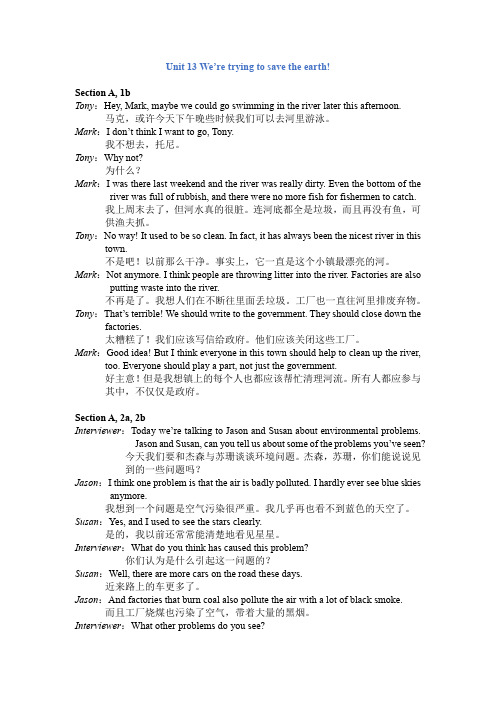
Unit 13 We’re trying to save the earth!Section A, 1bTony:Hey, Mark, maybe we could go swimming in the river later this afternoon.马克,或许今天下午晚些时候我们可以去河里游泳。
Mark:I don’t think I want to go, Tony.我不想去,托尼。
Tony:Why not?为什么?Mark:I was there last weekend and the river was really dirty. Even the bottom of the river was full of rubbish, and there were no more fish for fishermen to catch.我上周末去了,但河水真的很脏。
连河底都全是垃圾,而且再没有鱼,可供渔夫抓。
Tony:No way! It used to be so clean. In fact, it has always been the nicest river in this town.不是吧!以前那么干净。
事实上,它一直是这个小镇最漂亮的河。
Mark:Not anymore. I think people are throwing litter into the river. Factories are also putting waste into the river.不再是了。
我想人们在不断往里面丢垃圾。
工厂也一直往河里排废弃物。
Tony:That’s terrible! We should write to the government. They should close down the factories.太糟糕了!我们应该写信给政府。
他们应该关闭这些工厂。
Mark:Good idea! But I think everyone in this town should help to clean up the river, too. Everyone should play a part, not just the government.好主意!但是我想镇上的每个人也都应该帮忙清理河流。
九年级英语Unit13 课文翻译

Unit13 We’re trying to save the earth ! Section A 2d采访者:贾森和苏珊,对于解决这些问题,你们有什么想法?贾森:为了减少空气污染,我们应该乘坐公共汽车或者地铁,而不是开车。
苏珊:是的,或者骑自行车。
骑自行车还有别的好处,它对健康有益而且不用花钱。
采访者:好主意!那么,垃圾污染呢?苏珊:嗯,我认为一些生活小事有助于减少垃圾污染,比如自带袋子去购物。
我去年就这样做了。
贾森:我也是。
还有,我买外卖食品的时候,从来不拿一次性木筷或者塑料叉子。
我用家里的餐具。
苏珊:还要把垃圾扔进垃圾桶,保持公共场所的整洁和美丽,(这是)为了每个人。
采访者:所以,我们一起行动,就能影响他人,创造一个更美好的未来。
Section A ,3a拯救鲨鱼很多人都听说过鱼翅羹。
这道昂贵又著名的菜在中国南方特别流行。
但是每次当你喝鱼翅羹的时候,你是否意识到你杀了一整只鲨鱼?当人们捕捉到鲨鱼的时候,他们切掉鲨鱼的鱼鳍,然后把它们扔回大海。
失去鱼鳍的鲨鱼再也不能再水里游,会慢慢死去。
这种做法不仅残忍,而且对环境有害。
鲨鱼处于海洋生态系统食物链的顶端,如果他们的数量下降得太多,将会给所有的海洋生物带来危害。
很多人认为鲨鱼永远不会濒临灭绝,因为他们是食物链的最强者。
但事实上,每年有七百万的鲨鱼被捕杀和交易。
在过去的20年到30年,某些品种的鲨鱼数量下降了超过90%。
世界各地的环保组织,如野生救援协会和世界自然基金会,都在向公众宣讲“猎翅的(残忍)行为。
他们甚至已经呼吁政府立法停止鱼翅的销售。
到目前为止,没有任何科学研究表明,鱼翅对健康有好处,那么为什么要吃他们呢?帮助拯救鲨鱼吧!Section B , 2a重新思考重新使用,重新利用你经常扔掉你不在使用的东西吗?你是否曾想过这些东西还能很好地重新利用?如果你有一个充满创意的头脑,没有东西是废品。
你可能从来没听说过艾米.海斯,但她是一个非常不寻常的女性。
- 1、下载文档前请自行甄别文档内容的完整性,平台不提供额外的编辑、内容补充、找答案等附加服务。
- 2、"仅部分预览"的文档,不可在线预览部分如存在完整性等问题,可反馈申请退款(可完整预览的文档不适用该条件!)。
- 3、如文档侵犯您的权益,请联系客服反馈,我们会尽快为您处理(人工客服工作时间:9:00-18:30)。
Unit 13English for Science and TechnologyHighlights of the Unit 单元要点概述Practical Translation Training 实用翻译训练I. Formation of English Technical Terms 英语技术词语的构成II. Characteristic Syntax of EST 科技英语的句法特点III. Methods Employed in the Translation of EST 科技英语的翻译方法Reflections and Practice 思考与练习BACK单元要点概述实用翻译训练英译汉:The Age of Spiritual Machines实用翻译训练汉译英:技术创新I. 英语技术词语的构成1. 缀合法2. 复合法3. 缩合法4. 首字母缩略5. 专有名词II. 科技英语的句法特点1. 大量使用长句2. 大量使用名词化结构3. 广泛使用被动语态4. 大量使用非限定动词5. 时态的不同用法6. 习惯用后置定语III. 科技英语的翻译方法1. 将名词性短语扩展成汉语句子2. 将名词性短语转换成动宾结构3. 将定语成分转为独立句、状语从句等4. 将被动转换为主动5. 补充必要的词语本单元从科技英语的词汇和句法特点两个方面阐述科技英语的翻译。
英语技术语一般以三种形式存在,即单词式、复合式和短语式。
它们的构成与普通构词法大致相同,因此要译好英语技术词语就离不开构词法的帮助。
本单元从五个方面介绍了英语技术词语的翻译方法:1. 由级合法构成的术语,其含义为词缀(前级、后级)与词干的意义相加;2. 由复合法构成的术语,在大多数情况下它们往往是各词的合成意义,但也有不少例外,翻译时应格外当心;3. 由缩合法构成的术语,翻译时首先应弄清它们被掐头去尾的成分;4. 首字母缩略,这类术语有时会有不同的出处,翻译时需根据上下文弄清其确切含义; 5. 由专有名词构成的术语,翻译这类术语时应适当地增词或做必要的注释。
科技英语的句法特点主要表现在六个方面:1. 大量使用长句;2. 大量使用名词化结构;3. 广泛使用被动语态;4. 大量使用非限定动词; 5. 时态的不同用法; 6. 习惯用后置定语。
科技英语文体的翻译方法包括:1.将名词性短语扩展成汉语句子;2.将名词性短语转换成动宾结构;3.将定语成分转为独立句、状语从句等;4.将被动转换为主动;5.补充必要的词语。
Practical Translation Training1. English-Chinese TranslationThe age of Spiritual MachinesSince its beginning in the work of Alan Turing, the British mathematical genius who conceived of the computer, artificial intelligence has been overly anthropocentric. Its traditional-some would say misguided-aim has been to build machines that are like humans. For example, the Turing test for machine intelligence holds that a computer is a genuine thinker if it resembles a human being to the degree that someone interviewing both the computer and a human by teletype cannot tell which is which. Against this background, it is not surprising that researchers in artificial intelligence often make believe that their inventions possess human qualities. Turing himself described a simple computational mechanism as a " child-machine", to be "rewarded", "punished", and taught by a process intended to produce "discipline, "initiative". Turing's child-machine was a "creature" that was taught by an inspector of schools but could not be sent to school without "the other children making excessive fun of it".In a contemporary example,Daniel Dennett stow that Cog,a robot under construction at the MIT Artificial Intelligence Lab,is to have an "infancy and childhood". Cog has "hips"and a "waist", and will have skin and a face. Cog is to be "as human as possible in its wants and fears,likes and dislikes". It will "want to keep its mother's face in view" and is to "delight in learning,abhor error,strive for novelty,and recognize progress."Ray Kurzwell is another who anthropomorphizes machines:nanomachines(devices built on an atomic scale)have "brains", "bodies", "arms", "hands", and "little forgers". His new book The Age of Spiritual Machines,is an excellent example of the blurring of fact and fiction so common in discussions of artificial intelligence. He blends together present day technologies,such as artificial legs and breast implants,with those he foresees,such as computers that store "migrated" human brains.Notes and Explorations1. Alan Mathison Turing 艾伦,图灵(1921-1955)英国数学家2. overly anthropocentric 过度地以人类为中心的3. misguided adj. 令人误入歧途的;注意此句中插入语的翻译方法4. hold that 认为5. cannot tell which is which 分不清谁是人谁是机6. Against this background 在上述背景下7. make believe 假装8. computational mechanism 计算机械装置9. make fun of 取笑,嘲弄;注意此句中双重否定的译法10. MIT Artificial Intelligence Lab 麻省理工学院人工智能实验室;注意此句中Cog的同位语的译法11. keep something in view 牢记在心;在记忆中12. anthropomorphize v. 人格化,赋于人性13. nanomachines 纳米机器,nano十machines14. an atomic scale 原子尺度15. blend with 挽和在一起16. "migrated" human brains “被迁移的”人脑2. Chinese-English Translation技术创新我们正在进人一个知识经济的时代,这个时代的本质特征就是科学技术在经济增长中起着核心作用。
在发挥这个核心作用的过程中,技术创新被赋予了全新的内涵,要求以城市区域经济的系统的观点,从多种要素的角度构造城市技术创新体系。
建立和运用这样一个体系,是促进城市区域经济可持续发展的一块基石,是促进产业结构调整、加快经济增长方式转变的关键,也是迎接知识经济与挑战的必然选择。
Notes and Explanations1. 知识经济的时代an era of knowledge economy2. 发挥作用bring the function into play3. 赋予新的内涵take on a new sense4. 以……的观点in terms of/from the point of view of5. 城市区域经济urban zone economy6. 可持续发展的一块基石a cornerstone for the sustainable development7. 产业结构调整the adjustment of industrial structure8. 加快经济增长方式转变speed accelerate the transformation of the mode ofeconomic growthWith rapid and remarkable advances in modern science and technology, an increasingly large number of English technical terms have arisen in our daily life, giving rise to a new genre of register with vocabularies outside the range of the ordinary educated man-English for science and technology (EST). Today, more and more people are willing to accept these newly created technical terns, for the modern methods of scientific research, investigation and operation do produce numerous new concepts, materials and processes. In brief, scientific and technical registers provide a swift, economical, efficient, impersonal, sometimes international, means of exposition and discussion of specialized issues.Generally speaking, there is no special requirement for the translation of EST in comparison with general English except for its wording and characteristic structures. In this unit we are going to survey the translation of EST from two aspects:its vocabulary and syntax.I. Formation of English Technical TermsOne of the most distinctive features of EST is its technical terms,which not only account for a large part of English vocabulary,but also are the most important source of newly coined words in modern English,ranging over an extensive area of various fields. A mastery of them will benefit us a great deal in the translation of EST.In terms of form,English technical terms may be classified into three categories,namely,single words(e.g. robot机器人,Internet 因特网,etc.),compound forms(e.g. feedback 反馈,splashdown溅落,etc.)and phrases(e. g. on-and-off-the-road 路面越野两用的,anti-armored-fight-vehicle-missile 反装甲车导弹,power transmission relay system 送电中继体系,etc.). Since most of the technical terra come out of the basic rules of word-formation,it's necessary for us to conduct a brief survey of their formation.1. AffixationAffixation is an important means of coining new English words and technical terms, with prefix and suffix as inseparable elements of the words being coined. The advantage of affixation is evident:it is the most flexible means of forming new words and its potential of creation is almost boundless,therefore it is extensively used in the formation of technical terms. Besides prefix and suffix of English origin,there are some foreign borrowings,noticeably the Latin ones,e.g. bio-( 生命、生物),thermo-(热), electro-(电), aero-(空气), carbo-(碳), hydro-〔水〕, -ite(矿物), -mania(热、狂),etc. If we are familiar with these prefixes and suffixes,many technical terms of such formation can be translated appropriately. The following are some typical examples.● miniultrasonicprober =mini + ultra + sonic + prober 微型超声波金属探伤仪● macrospacetransship = macro + s pace + trans + ship 巨型窨转运飞船● teletypesetter = tele + type + setter 电传排字机● bathythermograph = bathy + thermo + graph 海水测温仪● barothermograph = baro + thermo + graph 气压湿度记录器● deoxyribonucleic = de + oxy + ribo + nucleic 脱氧核糖核的● photomorphogenesis = photo + morpho + genesis 光形态发生2. CompoundingThat two or more words combined to form a new word is called compounding. English technical terms formed by compounding generally take three forms:combining with a hyphen(e.g. salt-former卤素,dew-point露点,pulse-scaly脉冲定标器)or with-out it (e. g. fallout 放射性尘埃,waterlock 水闸,thunderstorm 雷暴),or two or more separate words forming a word combination(e. g. verbal translator 逐字翻译机,hover craft 气垫船,satellite antimissile observation system 卫星反导弹观察系统).Most of such compound words may be translated literally,i. e.,put the Chinese equivalents of the separate elements together and we get the Chinese equivalents of the compound words. Sometimes,however,there are exceptions. For example,bull's eye (靶心),cat-and-mouse(航向与指挥的),dog house(高频高压电源屏蔽罩), etc. -literal translation in tackling such terms may lead astray. Therefore whenever we are confronted with unfamiliar terms and are not sure of their meaning,we should frequently consult dictionaries of relevant specialties. In many cases some addition explanations are needed to make the original meaning clear and accurate.3. BlendingThis is a variant of compounding,omitting the latter part of the first word and cupping off the first part of the second word. Sometimes, however, either the first part or the second part of the overlapped word may be a full word. Generally speaking, this blending of words possesses the combined meaning of both, therefore, literal translation is used in translating such terms, with one element modifying the other.● smog = smoke + fog 烟雾● brunch = breakfast + lunch 早午餐/ 晚早餐● telex = teleprinter + exchange 电传● gravisphere = gravity + sphere 引力范围● medicare = medical + care 医疗保健● biorhythm = biological + rhythm 生理节奏● copyt ron = copy + elechon 电子复写(技术)4. AcronymAn acronym is a word made up from the first letter; of the name of something. Since it is very convenient to use this brief form,acronym is widely adopted in English technical terms. With the rapid development of science and technology,more and more acronyms are extensively used in~fields,therefore,it is up to the translator to discern their actual meaning in different context.● ADP automatic data processing 自动数据处理● AIDS Acq uired Immune Deficiency Syndrome 艾滋病● EDPM electronic data processing machine 电子数据处理机● GSV guided space vehicle 制导宇宙飞船● Laser light amplification by stimulated emission of radiation 激光● RAM random access memory 随机存取存储器● DINK d ual income, no kids 双收入无子女家庭Sometimes,an acronym happens to be a significant English word,or it may possess more than one meaning. In this case,special attention is necessary to pick out the proper one.● MOUSE minimum orbital unma nned satellite of the earth (仪表载重50公斤以下的)不载人的最小人造地球卫星● SALT Strategic Arms Limitation Talks 限制战略武器会谈● SNAP subsystem for nuclear auxiliary power (原子)核辅助动力子系统space nuclear auxiliary power 空间核辅助能源systems for nuclear auxiliary power 核辅助能(电)源系统● AS air scoop 空气收集器air seasoned 风干的(木材)air speed 空速、气流速率air station 航空站、飞机场American standard 美国标准atmosphere and space 大气层与宇宙空间automatic sprinkler自动洒水车automatic synchronizer自动同步器5. Proper NounsMany of the technical temps in English are borrowed from proper nouns such as names of people,places,firms,trade marks,organizations,and so on. In such cases,consulting relevant dictionaries will be of great help. Transliteration is usually adopted in dealing with such tams,and at the same time,labels that indicate the nature of such words are added to the corresponding translation.● Xerox 静电复制(derived from a trademark)● IBM System IBM 系统(derived from a US corporation)● Kuru 库鲁病(derived from a place in eastern New Guinea)● Alfven wave 阿尔文波(derived from the Swedish astrophysicist Hannes Alfven)● Chandler's wobble 钱得拉波动说(derided from the US astronomer Seth Carlo Chandler)Besides the above ways of word-formation,there are some other means to form technical terms in English. To name a few,clipping("剪截法" e.g. lab come from laboratory),Back-formation("逆序法" e. g. to lase comes from laser), Coinage ("造词法" e. g."quark" in physics),Functional Shift("词性转换法" e.g. to contract the terminal , here "contract" has been converted from a noun to a verb), Borrowing ( "借用法" e.g. "gene"is borrowed from German), and so on. In whatever circumstances,the discrimination of the original meaning and the contextual analysis are of vital importance. Only when we get accurate understanding of them,can we put them into Chinese exactly as they actually mean.II. Characteristic Syntax of EST1. More Long and Complicated SentencesEST as a formal style of writing usually consists of more long aid complicated sentences.When translated into Chinese,a long sentence may be cut into several parts. For example:● The efforts that have been made to expl ain optical phenomena by means of thehypothesis of a medium having the same physical character as an elastic solid body led,in the first instance,to the understanding of a concrete example of a medium which can transmit transverse vibration but later to the definite conclusion that there is no luminiferous medium having the physical character assumed in the hypothesis. 为了解释光学现象,人们曾试图假定有一种具有与弹性固体相同的物理性的介质。
